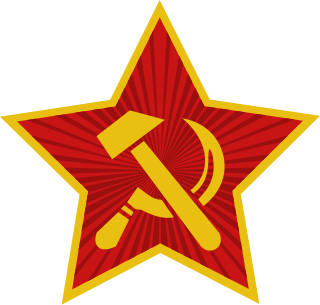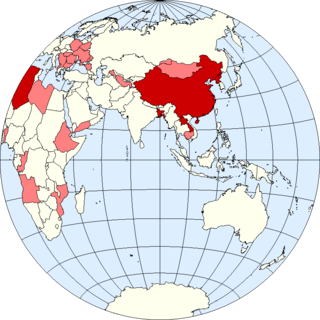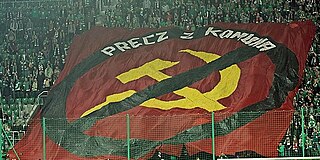Communism in Germany may refer to:
- The Bavarian Soviet Republic
- The German Democratic Republic (East Germany)
- The many communist parties in Germany
Communism in Germany may refer to:

Marxism–Leninism is a communist ideology that became the largest faction of the communist movement in the world in the years following the October Revolution. It was the predominant ideology of most communist governments throughout the 20th century. It was developed in Russia by Joseph Stalin and drew on elements of Bolshevism, Leninism, and Marxism. It was the state ideology of the Soviet Union, Soviet satellite states in the Eastern Bloc, and various countries in the Non-Aligned Movement and Third World during the Cold War, as well as the Communist International after Bolshevization.
Post-communism is the period of political and economic transformation or transition in post-Soviet states and other formerly communist states located in Central-Eastern Europe and parts of Latin America, Africa, and Asia, in which new governments aimed to create free market-oriented capitalist economies. In 1989–1992, communist party governance collapsed in most communist party-governed states. After severe hardships communist parties retained control in China, Cuba, Laos, North Korea, and Vietnam. SFR Yugoslavia began to disintegrate, which plunged the country into a long complex series of wars between ethnic groups and nation-states. Soviet-oriented communist movements collapsed in countries where they were not in control.

The Communist Party of Germany was a major far-left political party in the Weimar Republic during the interwar period, an underground resistance movement in Nazi Germany, and a minor party in West Germany during the postwar period until it was banned by the Federal Constitutional Court in 1956.

People's republic is an official title that is mostly used by current and former communist states, as well as other left-wing governments. It is mainly associated with soviet republics, socialist states following the doctrine of people's democracy, sovereign states with a democratic-republican constitution that usually mentions socialism, as well as some countries that do not fit into any of these categories.
Christian communism is a theological view that the teachings of Jesus compel Christians to support religious communism. Although there is no universal agreement on the exact dates when communistic ideas and practices in Christianity began, many Christian communists argue that evidence from the Bible suggests that the first Christians, including the Apostles in the New Testament, established their own small communist society in the years following Jesus' death and resurrection. Many advocates of Christian communism and other communists, including Karl Kautsky, argue that it was taught by Jesus and practised by the apostles themselves.
Hungarian Revolution most often refers to:

Earl Russell Browder was an American politician, spy for the Soviet Union, communist activist and leader of the Communist Party USA (CPUSA). Browder was the General Secretary of the CPUSA during the 1930s and first half of the 1940s. During World War I, Browder served time in federal prison as a conscientious objector to conscription and the war. Upon his release, Browder became an active member of the American Communist movement, soon working as an organizer on behalf of the Communist International and its Red International of Labor Unions in China and the Pacific region.
The history of communism encompasses a wide variety of ideologies and political movements sharing the core principles of common ownership of wealth, economic enterprise, and property. Most modern forms of communism are grounded at least nominally in Marxism, a theory and method conceived by Karl Marx and Friedrich Engels during the 19th century. Marxism subsequently gained a widespread following across much of Europe, and throughout the late 1800s its militant supporters were instrumental in a number of unsuccessful revolutions on that continent. During the same era, there was also a proliferation of communist parties which rejected armed revolution, but embraced the Marxist ideal of collective property and a classless society.

Anti-Sovietism or anti-Soviet sentiment are activities that were actually or allegedly aimed against the Soviet Union or government power within the Soviet Union.

Communist propaganda is the artistic and social promotion of the ideology of communism, communist worldview, communist society, and interests of the communist movement. While it tends to carry a negative connotation in the Western world, the term propaganda broadly refers to any publication or campaign aimed at promoting a cause and is/was used for official purposes by most communist-oriented governments. The term may also refer to political parties' opponents' campaign. Rooted in Marxist thought, the propaganda of communism is viewed by its proponents as the vehicle for spreading their idea of enlightenment of working class people and pulling them away from the propaganda of who they view to be their oppressors, that they claim reinforces exploitation, such as religion or consumerism. Communist propaganda therefore stands in opposition to bourgeois or capitalist propaganda.
Communism is a sociopolitical, philosophical, and economic ideology within the socialist movement, whose goal is the creation of a communist society, a socioeconomic order centered around common ownership of the means of production, distribution, and exchange that allocates products to everyone in society based on need. A communist society would entail the absence of private property and social classes, and ultimately money and the state.

Anti-communism is political and ideological opposition to communist beliefs, groups, and individuals. Organized anti-communism developed after the 1917 October Revolution in Russia, and it reached global dimensions during the Cold War, when the United States and the Soviet Union engaged in an intense rivalry. Anti-communism has been an element of many movements and different political positions across the political spectrum, including anarchism, centrism, conservatism, fascism, liberalism, nationalism, social democracy, socialism, leftism, and libertarianism, as well as broad movements resisting communist governance. Anti-communism has also been expressed by several religious groups, and in art and literature.

Communist rule in the People's Republic of Hungary came to an end in 1989 by a peaceful transition to a democratic system. After the Hungarian Revolution of 1956 was suppressed by Soviet forces, Hungary remained a communist country. As the Soviet Union weakened at the end of the 1980s, the Eastern Bloc disintegrated.
Museum of Communism may refer to:

Left communism, or the communist left, is a position held by the left wing of communism, which criticises the political ideas and practices espoused by Marxist–Leninists and social democrats. Left communists assert positions which they regard as more authentically Marxist than the views of Marxism–Leninism espoused by the Communist International after its Bolshevization by Joseph Stalin and during its second congress.

A popular front is "any coalition of working-class and middle-class parties", including liberal and social democratic ones, "united for the defense of democratic forms" against "a presumed Fascist assault". More generally, it is "a coalition especially of leftist political parties against a common opponent". However, other alliances such as the Popular Front of India have used the term, and not all leftist or anti-fascist coalitions use the term "popular front".
Spanish Revolution may refer to:
The liberal democratic basic order is a fundamental term in German constitutional law. It determines the unalienable, invariable core structure of the German commonwealth. As such, it is the core substance of the German constitution. Building upon more general definitions of liberal democracy, the term has a specific legal meaning in Germany and is part of the German system of a Streitbare Demokratie that bans attempts to dismantle the liberal democratic basic order by what German authorities refer to as "enemies of the Constitution" or "extremists".
The Victims of Communism Memorial is a memorial in Washington, D.C. It may also refer to: